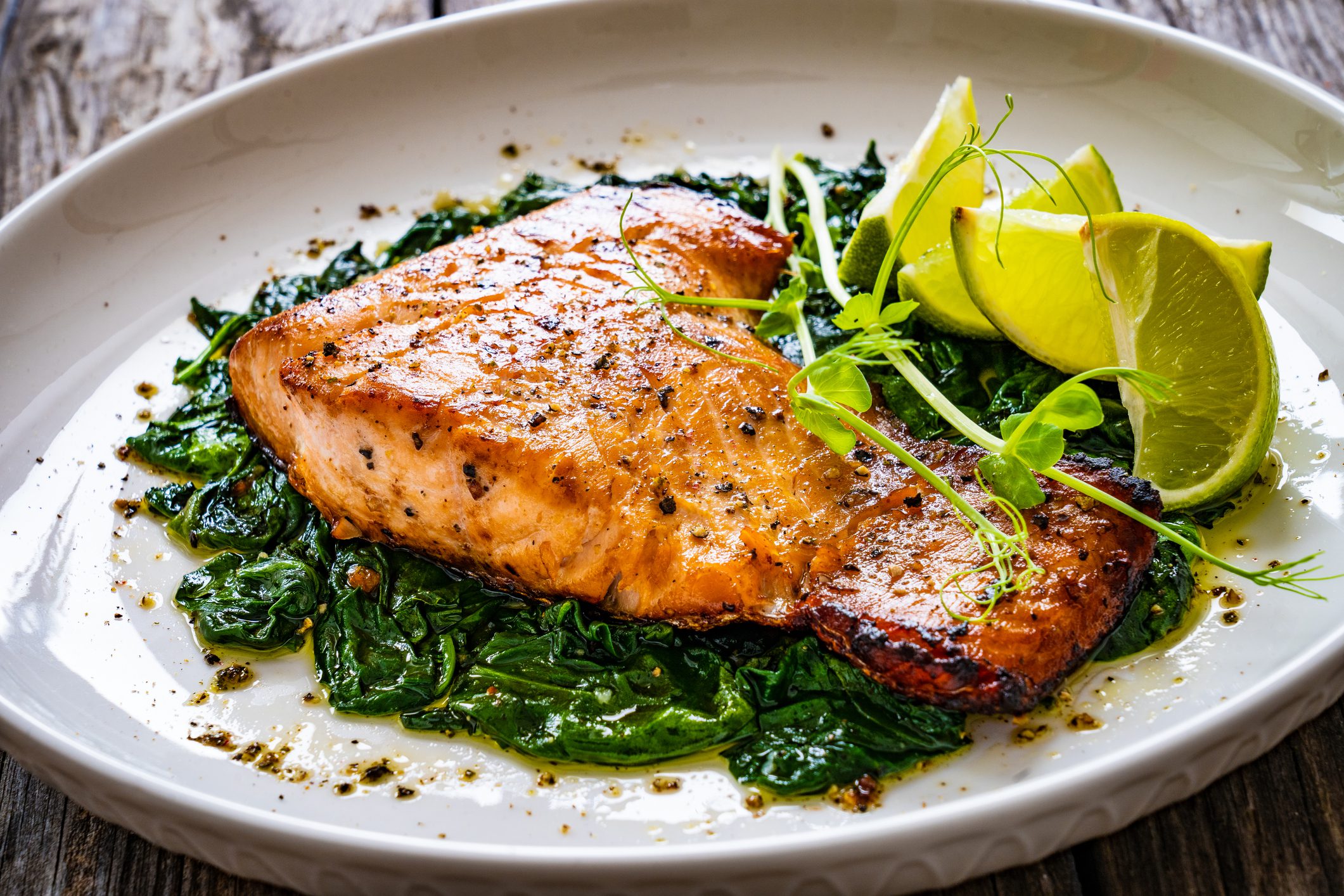Inflammation can be your best friend or worst enemy. When you cut your finger, your immune system immediately kicks into gear, releasing chemical messengers that increase blood flow to the injured area. We call this immediate response acute inflammation, which helps prevent infection and initiate the healing process.
Acute inflammation can be lifesaving, but chronic inflammation can be deadly. This low-grade type of inflammation continues to stay “on,” even when there's no longer an injury or infection to fight off. With chronic inflammation, your body stays stuck in prolonged battle mode. The repercussions are widespread. Chronic inflammation can crash your metabolism, wreck your blood sugar, downgrade your sleep, and increase your risk of disease.
The best way to fight inflammation is with your fork. Skip the frequent offenders, including vegetable oils, artificial sweeteners, sugar in all its many forms, and other food intolerances. You’ll replace those with plenty of anti-inflammatory foods.
Almost any recommendation in The Virgin Diet or The Sugar Impact Diet will help, but a few foods and beverages really stand out for their anti-inflammatory abilities. Incorporate these 15 (along with delicious recipes) into your meal plan regularly and you’ll be fighting inflammation, one delicious bite or sip at a time.
1. Chia Seeds
These tiny seeds pack a mighty punch. Chia seeds are high in alpha-linolenic acid (ALA), a plant-based omega-3 fatty acids that help reduce inflammation.1
Chia seeds are also a fiber heavyweight. Optimal amounts of fiber (I’m talking about at least 35 grams and preferably up to 50 daily) can lower damaging inflammation, which left unchecked can lead to heart disease and other serious health issues.2
Inflammation that starts in your gut can become systemic inflammation, impacting your heart, brain, and every other organ. Fiber supports a balance of healthy gut bacteria, helping to reduce this inflammation and diseases like inflammatory bowel disease (IBD).3
Chia seeds are high in protein as well. They’re one of the few plant foods that contain all nine essential amino acids, making them a complete protein source. Their flavonoids and other antioxidants protect against damaging free radicals that can contribute to chronic inflammatory conditions.4
These little seeds are a good source of minerals, too, including magnesium—a deficiency of which can contribute to inflammation.5 The vitamin C in chia also helps manage inflammatory markers, including high-sensitivity C-reactive protein (hs-CRP).6 Ditto for vitamin E, which helps lower inflammation.7
Try this recipe: Berry Chia Seed Pudding blends berries and coconut milk for a delicious breakfast in minutes. If you’re feeling chocolate-y, this Chocolate Berry Chia Pudding hits the spot.
2. Flax Seeds
Flax seeds share some nutritional similarities with chia seeds: they’re packed with anti-inflammatory ALA, protein, fiber, and other vitamins and minerals.
However, they’re slightly larger and have a distinct nutty taste. Compared with chia seeds, they’re a bit lower in fiber and calcium, but higher in ALA and antioxidants called lignans that can help manage inflammation.8
Buy flax seeds whole and grind them yourself for optimal freshness and nutrition. Otherwise, they can pass through your digestive system intact because of their tough outer shell that’s difficult to break down. As a result, you won’t be able to absorb those nutrients.
Ground flax seeds also work well in baked goods, loaded smoothies, or even as an egg substitute (simply mix 1 tbsp ground flax with 3 tbsp water to use in place of eggs in baking).
Try this recipe: This Stress-Busting Chocolate Berry Smoothie makes getting anti-inflammatory ingredients like blueberries, avocado, chia seeds, and flax seeds super easy.
3. Walnuts
This powerhouse nut is packed with anti-inflammatory nutrients including fiber, vitamin E, magnesium, antioxidants, and the omega-3 fat, ALA. In fact, walnuts have the highest amounts of ALA compared with other nuts.9
Altogether, these nutrients provide a range of anti-inflammatory properties, supporting immune health and reducing your risk of disease.10
The prebiotics in walnuts also help feed your healthy gut bacteria and manage inflammation in your gut and elsewhere.11 (Worth repeating: When gut health crashes and inflammation soars, your entire body feels that impact.)
More isn’t better here, though. Nuts are notoriously easy to overeat, so if you find your hand reaching into the jar again and again, portion them out. About an ounce of walnuts is all you need to get their anti-inflammatory benefits.
Try this recipe: These Lentil Nut Burgers with Cilantro Vinaigrette go above and beyond traditional veggie burgers, earning their nutty flavor from raw walnuts.
Omega Plus provides a therapeutic amount of the omega-3 fatty acids eicosapentaenoic acid (EPA) and docosahexaenoic acid (DHA), along with vitamin E isomers as Delta Gold®, in one easy-to-take softgel.*
4. Almonds
This popular tree nut contains a monounsaturated fat called oleic acid. Perhaps best known for heart health, this fatty acid has impressive anti-inflammatory benefits, too.12 Research shows that almonds can reduce several markers of inflammation, including CRP and interleukin- 6 (IL-6).13
Almonds are also a great source of vitamin E, which can neutralize free radicals and manage inflammation. Antioxidants, fiber, and hard-to-get nutrients like magnesium give them more anti-inflammatory power. As with walnuts, you only need about an ounce to get these benefits.
Try this recipe: Smoked Paprika and Cayenne Roasted Almonds put canned almonds to shame, dialing up the flavor factor with bold spices.
5. Blueberries
Blueberries are rich in anthocyanins, a type of flavonoid pigment responsible for their deep blue or purple color. Anthocyanins provide powerful antioxidant benefits that can also help balance blood-sugar levels and lower inflammation.14
Other anti-inflammatory flavonoids in blueberries include quercetin, along with vitamin C, gut-supporting soluble fiber, and polyphenolic compounds like resveratrol.15
Unfortunately, conventional blueberries are also loaded with something you don’t want: pesticides. Choose organic whenever you can.
Try this recipe: Blueberry Power Muffins provide a hearty, satisfying breakfast on those mornings when you want something chewy and warm.
6. Turmeric
This member of the ginger family gives curry its bold yellow color. Among turmeric’s beneficial compounds are curcuminoids, the most studied of which is curcumin. Curcumin can help neutralize damaging free radicals and suppress molecules involved in the inflammatory response.
Those are the reasons critics praise curcumin’s ability to fight inflammation, making it ideal for conditions like arthritis and for liver support as well.16 Other inflammatory conditions that curcumin can improve include IBD and skin conditions like psoriasis.17
Try this recipe: Golden Milk Turmeric Smoothie blends turmeric, coconut oil, flaxseed, and ginger in a powerful anti-inflammatory loaded smoothie.
7. Ginger
A flowering plant with a pungent flavor, ginger has a long history of traditional medicinal use for its potential health benefits, including its anti-inflammatory properties. It can inhibit the activity of inflammatory enzymes, helping your body better manage inflammation.18
A compound called gingerol gives ginger its taste as well as its anti-inflammatory benefits. And like turmeric, ginger also contains antioxidants that can neutralize free radicals.
Ginger is also known to help reduce gut inflammation, improve gut-barrier function, and support healthy gut bacteria. Those anti-inflammatory effects can even support post-workout recovery; studies show ginger can reduce muscle pain after intense physical activity.19
Try this recipe: Stir-Fried Kale with Ginger will satisfy the most-finicky eater with its flavorful ginger and coconut aminos.
8. Garlic
This popular herb is known for its distinct pungent flavor and its potential health benefits. Garlic's main active compound, allicin, creates that characteristic aroma and its anti-inflammatory benefits.
Garlic contains sulfur-containing compounds, which can inhibit inflammation.20 Flavonoids, sulfurous compounds, and other antioxidants in garlic help reduce the oxidative stress that can contribute to inflammation. And its prebiotics can promote the growth of healthy gut bacteria and reduce gut inflammation.21
Try this recipe: Garlic Hummus with Lentil Chips makes a guaranteed-to-please party chip and dip or a before-dinner starter.
9. Wild-Caught Salmon
When it comes to inflammation-fighting nutrients, salmon is a clear winner thanks to its excellent source of EPA andDHA. These two omega-3 fatty acids provide wide-ranging anti-inflammatory benefits for brain health, blood-sugar balance, and so much more.
Wild-caught salmon is a nutrient powerhouse, including magnesium, selenium, vitamin E, and astaxanthin (which give salmon its pink hue). These and other nutrients reduce the oxidative stress that can contribute to inflammation.
Salmon is one of the few food sources of anti-inflammatory vitamin D, too. Research shows that optimal vitamin-D levels can reduce the risk of inflammatory diseases.22
Vitamin D Plus provides an impressive 5,000 IU (125 mcg) of vitamin D in a highly absorbable form, along with vitamin K and geranylgeraniol to support bone, immune, and cardiovascular health.*
Last but certainly not least, salmon is an excellent source of high-quality protein for tissue repair, minimizing inflammation-related tissue damage, supporting your immune system, building muscle, and so much more.
Try this recipe: Detoxifying Asian-Style Salmon Stir-Fry is an anti-inflammatory powerhouse meal that rivals the flavor of your favorite bistro dish.
10. Broccoli
This cruciferous vegetable is high in sulforaphane, a sulfur-containing compound known for its potent anti-inflammatory and antioxidant effects, which are amplified by the phytonutrients quercetin, kaempferol, and lutein.
These nutrients work together with other antioxidants in broccoli, including vitamin C, beta-carotene, and flavonoids.
Altogether, that gives broccoli a broad range of nutrients that neutralize inflammation-triggering free radicals. Broccoli is a good source of soluble and insoluble fiber to support gut health and reduce gut inflammation as well.
Try this recipe: Paleo Steamed Broccoli with Garlic Oil Drizzle upgrades this cruciferous vegetable with a garlic infusion.
11. Spinach
I have to be honest here: I wanted to include kale as the top leafy green, but I didn’t because spinach is more accessible—it’s easier to find and easier to swallow. Thanks to its sulfurous compounds, kale has a bitter taste that isn't appealing to everyone (though my Chipotle Kale Chips recipe may change that).
Spinach still delivers a home run. Its broad range of anti-inflammatory nutrients includes flavonoids, carotenoids, and other antioxidant compounds.
Spinach is also an antioxidant-vitamin superstar, providing vitamin C, vitamin E, and vitamin A (as beta-carotene). It's also an excellent source of anti-inflammatory magnesium, too, and its soluble and insoluble fiber delivers the support your gut needs.
While not as high as chia or flax seeds, spinach does also contain a small amount of the omega-3, ALA.
For some people, the oxalates in raw spinach can be a problem. Cooking spinach and other oxalate-containing foods can minimize any potential issues. If you want to use it in your smoothies, I recommend steaming it before freezing and blending.
Try this recipe: Pan-Seared Scallops with Bacon and Spinach combines scallops (high in anti-inflammatory omega 3s), spinach, and bacon for an out-of-this-world meal.
12. Green Tea
Green tea was discovered around 4,000 years ago in China. Today, studies recognize many of the health benefits that make this beverage so popular.
Green tea’s anti-inflammatory benefits come from a polyphenol called catechins. Epigallocatechin gallate (EGCG), the most abundant and potent catechin in green tea, can inhibit the production and activity of inflammatory substances in the body.23
Green tea's antioxidant support boosts that anti-inflammatory action. This beverage’s calming effect is thanks to an amino acid called L-theanine, which can also help lower inflammation.24 Green tea can curb your appetite and boost your metabolism so you lose weight faster, too.
Try this recipe: Chai Green Tea Latte with Whipped Coconut Cream is a delicious spin on the traditional latte, with all the flavor and no problem ingredients like the coffee-shop version.
13. Extra-Virgin Olive Oil (EVOO)
Extra-virgin olive oil is rich in an anti-inflammatory fatty acid called oleic acid. (I mentioned it before with almonds.)
The polyphenolic compounds in EVOO (many of them, like oleuropein, can be hard to pronounce) provide an antioxidant, anti-inflammatory boost. EVOO can also support healthy gut bacteria and reduce gut inflammation. Its ability to inflammatory markers in atherosclerosis gives EVOO its heart-health status.25
Compared with regular olive oil, extra-virgin olive oil is less refined and retains higher levels of polyphenols. EVOO is great in salad dressings and dips, but not for higher-heat cooking. EVOO has a lower smoke point (the point where an oil starts to break down) compared with other oils. Using it at higher temperatures can also damage the fragile antioxidants and reduce its nutrient impact.
Try this recipe: JJ's Cobb Salad is a food-intolerance-free version of the classic, with a simple extra-virgin olive oil dressing that works for any salad.
14. Dark Chocolate
Many benefits of dark chocolate, including its ability to fight cardiovascular diseases and brain-related disorders like Alzheimer's, come from its anti-inflammatory benefits. The flavonoids in dark chocolate, particularly flavanols, are powerful antioxidants that help fight inflammation. Polyphenols and catechins provide further antioxidant, anti-inflammatory benefits. Dark chocolate also provides some magnesium. (One theory why we crave chocolate: many folks are deficient in this mineral.)
Of course, not all dark chocolate is created equally. Look for one that’s at least 80% cacao, sweetened with erythritol or another approved sweetener, and keep your portions in check. Follow those guidelines, and you can enjoy dark chocolate every day.
Try this recipe: How could I choose just one? With this healthy chocolate recipe roundup, you’ll find chocolate-based loaded smoothies, party pleasers, ice cream and other desserts, and more.
15. Avocado
Rich in oleic acid (the same heart-healthy fat in almonds and EVOO), avocado also provides an excellent source of dietary fiber that can help manage inflammatory conditions including IBD.26 In fact, a medium avocado gives you a whopping 10 grams of fiber!
Antioxidants, including carotenoids like lutein and zeaxanthin, vitamin E, and vitamin C, provide additional anti-inflammatory support.
Try this recipe: Creamy Roasted Avocado blends creamy avocado with other anti-inflammatory ingredients like roasted garlic and toasted pumpkin seeds.
Fighting Inflammation Requires More Than Just Your Fork
Incorporating these delicious foods and beverages provides an excellent foundation to fight chronic inflammation. Left unchecked, this low-grade, deadly inflammation can contribute to cardiovascular diseases, diabetes, autoimmune disorders, and even certain types of cancer. But you can reduce its damage, and your diet is the best way to start.
Here are a few other ways to battle inflammation:
- Get deep, restorative sleep for repair and recovery, which allows your body to better manage inflammation. Aim for at least seven (and preferably more like nine) hours of quality sleep each night to support your body's natural anti-inflammatory processes.
- Reduce stress levels. Chronic stress triggers the release of cortisol. When this stress hormone stays elevated when it shouldn’t be, chronic inflammation can result. Meditation, yoga, deep breathing exercises, spending time in nature, or walking your dog can lower stress levels and reduce inflammation.
- Regular physical activity has anti-inflammatory effects on the body, too. Research shows that strength training can help your body manage inflammation.27
- Stay hydrated. Water helps transport nutrients, oxygen, and immune cells throughout your body. Don’t smoke, imbibe mindfully, and minimize your exposure to environmental toxins (including chemicals and pesticides, which trigger inflammation).
If you’re looking to take these anti-inflammatory strategies to the next level, I hope you’ll consider my Metabolism Rescue Program. This cutting-edge plan helps repair metabolic damage from chronic dieting, helping you lose fat and keep it off while reducing inflammation. The program features a comprehensive guide, an exclusive one-hour masterclass, and a hand-selected bundle of metabolism-supporting supplements (All-In-One Shake, Metabolic Reset™, and Collagen Peptides Powder).*
References:
- Rahimlou M, Asadi M, Banaei Jahromi N, Mansoori A. Alpha-lipoic acid (ALA) supplementation effect on glycemic and inflammatory biomarkers: A Systematic Review and meta- analysis. Clin Nutr ESPEN. 2019 Aug;32:16-28. doi: 10.1016/j.clnesp.2019.03.015. Epub 2019 May 2. PMID: 31221283.
- Shivakoti R, Biggs ML, Djoussé L, Durda PJ, Kizer JR, Psaty B, Reiner AP, Tracy RP, Siscovick D, Mukamal KJ. Intake and Sources of Dietary Fiber, Inflammation, and Cardiovascular Disease in Older US Adults. JAMA Netw Open. 2022 Mar 1;5(3):e225012. doi: 10.1001/jamanetworkopen.2022.5012. PMID: 35357453; PMCID: PMC8972036.
- Ma W, Nguyen LH, Song M, Wang DD, Franzosa EA, Cao Y, Joshi A, Drew DA, Mehta R, Ivey KL, Strate LL, Giovannucci EL, Izard J, Garrett W, Rimm EB, Huttenhower C, Chan AT. Dietary fiber intake, the gut microbiome, and chronic systemic inflammation in a cohort of adult men. Genome Med. 2021 Jun 17;13(1):102. doi: 10.1186/s13073-021-00921-y. PMID: 34140026; PMCID: PMC8212460.
- Arulselvan P, Fard MT, Tan WS, Gothai S, Fakurazi S, Norhaizan ME, Kumar SS. Role of Antioxidants and Natural Products in Inflammation. Oxid Med Cell Longev. 2016;2016:5276130. doi: 10.1155/2016/5276130. Epub 2016 Oct 10. PMID: 27803762; PMCID: PMC5075620.
- Nielsen FH. Magnesium deficiency and increased inflammation: current perspectives. J Inflamm Res. 2018 Jan 18;11:25-34. doi: 10.2147/JIR.S136742. PMID: 29403302; PMCID: PMC5783146.
- Ellulu MS, Rahmat A, Patimah I, Khaza'ai H, Abed Y. Effect of vitamin C on inflammation and metabolic markers in hypertensive and/or diabetic obese adults: a randomized controlled trial. Drug Des Devel Ther. 2015 Jul 1;9:3405-12. doi: 10.2147/DDDT.S83144. PMID: 26170625; PMCID: PMC4492638.
- Asbaghi O, Sadeghian M, Nazarian B, Sarreshtedari M, Mozaffari-Khosravi H, Maleki V, Alizadeh M, Shokri A, Sadeghi O. The effect of vitamin E supplementation on selected inflammatory biomarkers in adults: a systematic review and meta-analysis of randomized clinical trials. Sci Rep. 2020 Oct 14;10(1):17234. doi: 10.1038/s41598-020-73741-6. PMID: 33057114; PMCID: PMC7560744.
- Vinardell MP, Mitjans M. Lignins and Their Derivatives with Beneficial Effects on Human Health. Int J Mol Sci. 2017 Jun 7;18(6):1219. doi: 10.3390/ijms18061219. PMID: 28590454; PMCID: PMC5486042.
- Bowden, Jonny. The 150 Healthiest Foods on Earth: The Surprising, Unbiased Truth about What You Should Eat and Why (p. 162). Creative Publishing International. Kindle Edition.
- an N, Fusco JL, Rosenberg DW. Antioxidant and Anti-Inflammatory Properties of Walnut Constituents: Focus on Personalized Cancer Prevention and the Microbiome. Antioxidants (Basel). 2023 Apr 22;12(5):982. doi: 10.3390/antiox12050982. PMID: 37237848; PMCID: PMC10215340.
- Looijer-van Langen MA, Dieleman LA. Prebiotics in chronic intestinal inflammation. Inflamm Bowel Dis. 2009 Mar;15(3):454-62. doi: 10.1002/ibd.20737. PMID: 18831524; PMCID: PMC5148622.
- Santa-María C, López-Enríquez S, Montserrat-de la Paz S, Geniz I, Reyes-Quiroz ME, Moreno M, Palomares F, Sobrino F, Alba G. Update on Anti-Inflammatory Molecular Mechanisms Induced by Oleic Acid. Nutrients. 2023 Jan 1;15(1):224. doi: 10.3390/nu15010224. PMID: 36615882; PMCID: PMC9824542.
- Fatahi S, Daneshzad E, Lotfi K, Azadbakht L. The Effects of Almond Consumption on Inflammatory Biomarkers in Adults: A Systematic Review and Meta-Analysis of Randomized Clinical Trials. Adv Nutr. 2022 Oct 2;13(5):1462-1475. doi: 10.1093/advances/nmab158. PMID: 34967837; PMCID: PMC9526836.
- Aboonabi A, Aboonabi A. Anthocyanins reduce inflammation and improve glucose and lipid metabolism associated with inhibiting nuclear factor-kappaB activation and increasing PPAR-γ gene expression in metabolic syndrome subjects. Free Radic Biol Med. 2020 Apr;150:30-39. doi: 10.1016/j.freeradbiomed.2020.02.004. Epub 2020 Feb 13. PMID: 32061902.
- Li Y, Yao J, Han C, Yang J, Chaudhry MT, Wang S, Liu H, Yin Y. Quercetin, Inflammation and Immunity. Nutrients. 2016 Mar 15;8(3):167. doi: 10.3390/nu8030167. PMID: 26999194; PMCID: PMC4808895.
- Bowden, Jonny. The 150 Healthiest Foods on Earth: The Surprising, Unbiased Truth about What You Should Eat and Why (p. 293). Creative Publishing International. Kindle Edition.
- Peng Y, Ao M, Dong B, Jiang Y, Yu L, Chen Z, Hu C, Xu R. Anti-Inflammatory Effects of Curcumin in the Inflammatory Diseases: Status, Limitations and Countermeasures. Drug Des Devel Ther. 2021 Nov 2;15:4503-4525. doi: 10.2147/DDDT.S327378. PMID: 34754179; PMCID: PMC8572027.
- Zick SM, Turgeon DK, Ren J, Ruffin MT, Wright BD, Sen A, Djuric Z, Brenner DE. Pilot clinical study of the effects of ginger root extract on eicosanoids in colonic mucosa of subjects at increased risk for colorectal cancer. Mol Carcinog. 2015 Sep;54(9):908-15. doi: 10.1002/mc.22163. Epub 2014 Apr 24. PMID: 24760534; PMCID: PMC4208969.
- Mashhadi NS, Ghiasvand R, Askari G, Hariri M, Darvishi L, Mofid MR. Anti-oxidative and anti-inflammatory effects of ginger in health and physical activity: review of current evidence. Int J Prev Med. 2013 Apr;4(Suppl 1):S36-42. PMID: 23717767; PMCID: PMC3665023.
- Lee DY, Li H, Lim HJ, Lee HJ, Jeon R, Ryu JH. Anti-inflammatory activity of sulfur-containing compounds from garlic. J Med Food. 2012 Nov;15(11):992-9. doi: 10.1089/jmf.2012.2275. Epub 2012 Oct 11. PMID: 23057778; PMCID: PMC3491620.
- Ried K, Travica N, Sali A. The Effect of Kyolic Aged Garlic Extract on Gut Microbiota, Inflammation, and Cardiovascular Markers in Hypertensives: The GarGIC Trial. Front Nutr. 2018 Dec 11;5:122. doi: 10.3389/fnut.2018.00122. PMID: 30619868; PMCID: PMC6297383.
- Cannell JJ, Grant WB, Holick MF. Vitamin D and inflammation. Dermatoendocrinol. 2015 Jan 29;6(1):e983401. doi: 10.4161/19381980.2014.983401. PMID: 26413186; PMCID: PMC4580066.
- Ohishi T, Goto S, Monira P, Isemura M, Nakamura Y. Anti-inflammatory Action of Green Tea. Antiinflamm Antiallergy Agents Med Chem. 2016;15(2):74-90. doi: 10.2174/1871523015666160915154443. PMID: 27634207.
- Li MY, Liu HY, Wu DT, Kenaan A, Geng F, Li HB, Gunaratne A, Li H, Gan RY. L-Theanine: A Unique Functional Amino Acid in Tea (Camellia sinensis L.) With Multiple Health Benefits and Food Applications. Front Nutr. 2022 Apr 4;9:853846. doi: 10.3389/fnut.2022.853846. PMID: 35445053; PMCID: PMC9014247.
- Wongwarawipat T, Papageorgiou N, Bertsias D, Siasos G, Tousoulis D. Olive Oil-related Anti-inflammatory Effects on Atherosclerosis: Potential Clinical Implications. Endocr Metab Immune Disord Drug Targets. 2018;18(1):51-62. doi: 10.2174/1871530317666171116103618. PMID: 29149823.
- de Oliveira ECS, Dalmau LM, de Almeida Costa CAR, de Almeida Junior LD, Ballard CR, Maróstica Junior MR, Stahl MA, Grimaldi R, Witaicenis A, Di Stasi LC. Dietary intervention with avocado (Persea americana Mill.) ameliorates intestinal inflammation induced by TNBS in rats. Inflammopharmacology. 2023 Feb;31(1):485-498. doi: 10.1007/s10787-022-01128-2. Epub 2022 Dec 31. PMID: 36586042.
- Calle MC, Fernandez ML. Effects of resistance training on the inflammatory response. Nutr Res Pract. 2010 Aug;4(4):259-69. doi: 10.4162/nrp.2010.4.4.259. Epub 2010 Aug 31. PMID: 20827340; PMCID: PMC2933442.
*These statements have not been evaluated by the Food & Drug Administration. Products mentioned are not intended to diagnose, treat, cure, or prevent any disease. The views in this blog by JJ Virgin should never be used as a substitute for professional medical advice. Please work with a healthcare practitioner concerning any medical problem or concern.





